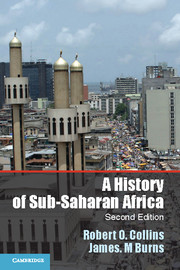Book contents
- Frontmatter
- Dedication
- Contents
- Acknowledgments
- Introduction
- Part I Foundations
- Part II Africa in World History
- Part III Imperial Africa
- Part IV Independent Africa
- 22 Nationalism and the independence of colonial Africa
- 23 The Union of South Africa and the apartheid state
- 24 A decade of hope
- 25 Cold War Africa
- 26 Africa at the beginning of the twenty-first century
- Index
- References
23 - The Union of South Africa and the apartheid state
Published online by Cambridge University Press: 05 June 2014
- Frontmatter
- Dedication
- Contents
- Acknowledgments
- Introduction
- Part I Foundations
- Part II Africa in World History
- Part III Imperial Africa
- Part IV Independent Africa
- 22 Nationalism and the independence of colonial Africa
- 23 The Union of South Africa and the apartheid state
- 24 A decade of hope
- 25 Cold War Africa
- 26 Africa at the beginning of the twenty-first century
- Index
- References
Summary
The history of South Africa in the twentieth century, culminating in an independent, democratic republic, appears to have much in common with that of the white settler colonies in East and Central Africa. As in these colonies to the north, whites in South Africa dominated the economy and government at the beginning of the twentieth century. At the same time, a minority of mission-educated African men had begun to advocate the reform of colonial government in the language of European liberalism; this evolved into more radical demands that ultimately led to the establishment of a multiparty democracy by the end of that century. These superficial similarities, however, cannot obscure the important differences between the history of South Africa during the twentieth century and that of its northern neighbors. White rule remained deeply entrenched in the country decades after most African colonies had become independent from white settler domination. A black South African born in 1957, the year the Gold Coast became the independent state of Ghana, would be nearly forty years old when he or she would, for the first time, be allowed to vote in a South African election. Unlike Africans in the other settler colonies, he or she would grow up in a sophisticated and wealthy industrial economy. This affluence would sustain the privileges and prosperity of a white minority whose standard of living was comparable to that of the wealthy citizens of the Western world.
- Type
- Chapter
- Information
- A History of Sub-Saharan Africa , pp. 344 - 356Publisher: Cambridge University PressPrint publication year: 2013



